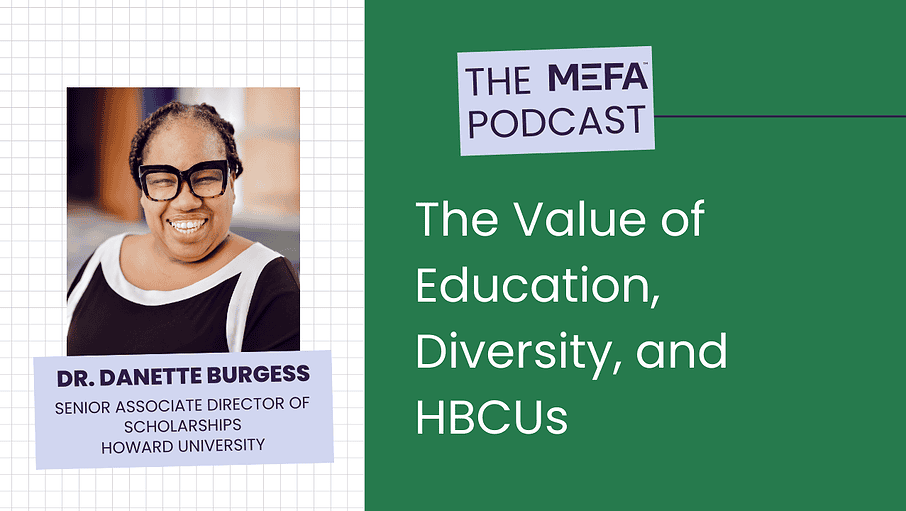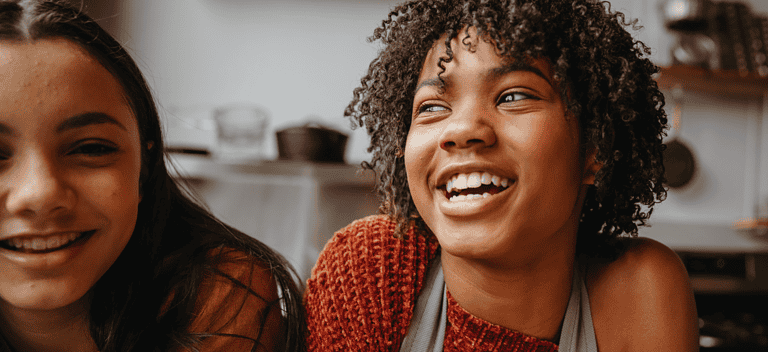

Resources Mentioned in this Episode
Jonathan Hughes: [00:00:00] Hi folks, welcome to The MEFA Podcast. My name is Jonathan Hughes and on our show today, we have EASFAA President Dr. Danette Burgess. She is the Senior Associate Director of Scholarships at world famous Howard University in Washington, D. C. She’s going to talk to us all about HBCUs, that’s Historically Black Colleges and Universities in general.
And Howard specifically, she’s going to talk to us about the value of college for students and tell us how that manifested in her own life. And she’s going to talk to us about the value of diversity for students and professionals in the financial aid field. I think you will love meeting Danette as I did and hearing what she has to say.
I’ll be back after our conversation for the wrap. Dr. Danette Burgess is the [00:01:00] Senior Associate Director of Scholarships at Howard University in Washington, D. C. She earned a Bachelor of Science degree from Norfolk State University, an MBA degree from Strayer University, both with a concentration in marketing and a Doctor of Ministry degree from Newburgh Seminary and College of the Bible.
Danette is a member of EASFAA. That’s the Eastern Association of Student Financial Administrators, the executive council that is where she serves currently as the president. Dr. Burgess also served as the regional representative for the NASFAA. That’s the National Association of Student Financial Aid Administrators, diversity task force.
She serves on the NASFAA board as a board observer and has presented at various conferences on diversity, equity, and inclusion. Dr. Burgess has served in leadership positions, both professionally and in her community and in her church, Dr. Burgess, thank you so [00:02:00] much for being here in The MEFA Podcast.
Danette Burgess: Thank you so much for having me.
Jonathan Hughes: Can you tell me what your educational journey has been and what has led you to this point?
Danette Burgess: You’ve indicated all of my degrees and all of those things. And education has always been very important to me. And so I started with a bachelor’s degree. Said, no, I’m not doing a master’s degree.
Then I did an MBA and then I said, no, I’m not doing a doctorate degree. Then I did a doctorate degree. So that’s how my journey started and just encouraging others, about going to school and education, how important it is.
Jonathan Hughes: And what changed your mind at each of those junctures that you said, no, I’m not going to do it. And then you decided to go ahead and do it.
Danette Burgess: So for the MBA, when I went to do the MBA, my children said, mom, why not? I said, absolutely. So that was that. The Doctor of Ministry, my [00:03:00] uncle Reverend Dr. Clinton H. Saunders Jr., who has now, who passed away in 2015, had indicated to me, okay, you got that MBA, now it’s time for the doctorate. And I waited a little bit, and then I pursued that degree as well.
Jonathan Hughes: As you said, education then definitely seems to be important for its own sake to you. Is that fair to say?
Danette Burgess: Yes. Absolutely. Absolutely. Absolutely.
Jonathan Hughes: And so how did that lead you to a career in financial aid and to Howard specifically?
Danette Burgess: So just like everyone says that works in financial aid by accident, but probably not, but it probably was not by accident. It was by accident, but it was also on purpose. Through my college career, I always helped individuals complete their FAFSA. And that was just something that I did. And so [00:04:00] then an opportunity for my first financial aid position came about as a financial aid counselor and I started there and then this opportunity to come to Howard university came to me and it has been a great opportunity for my growth as a financial aid professional.
Jonathan Hughes: And where was the first financial aid job that you worked at?
Danette Burgess: I was, it was at a proprietary school and classes started every five weeks. So every five weeks I was processing financial aid information for students.
Jonathan Hughes: Wow. Is that’s the, I’m I remember doing a financial aid training that was for financial aid officers at colleges and I was just doing it to familiarize myself with the FAFSA and things like that and the big takeaway that I have from that. That was how much financial aid administrators actually do.
Danette Burgess: Yes. As financial aid officers, we’re not only financial aid administrators, but we’re counselors.[00:05:00] To some of our students, we’re parents, pseudo parents to them away from home. If they have questions about things, it may be financial aid and maybe regarding a class or something like that. They feel comfortable enough coming to us because they trust us.
Jonathan Hughes: That’s a big deal because one of the things I always say on this podcast is talk to your financial aid office. And I know that a lot of students feel shy to do that. Or, maybe a little insecure to do that. Just going off here, how did you break down that shyness or how do you reach out and make students feel welcome?
Danette Burgess: I think letting them know, being showing empathy. And, saying things like, you know what? I know this is difficult. Financial aid and finances are always conversations that are difficult. Know that we are here to support you. Any information [00:06:00] that you share with us is kept confidential. I think doing that piece and then what happens sometimes is you help one student and then they tell their friend. Oh, Dr. Burgess helped me with this, yeah, and that’s how it that’s how it started and it usually, you know starts from their first year as freshmen until they graduate And sometimes some of them come back to the campus just to say hi, just to let you know what they’re doing now in their life. So I think all of those pieces, so establishing relationships.
Jonathan Hughes: That sounds very rewarding when a student does that.
Danette Burgess: Yes. Yes. Or to hear about what they’re doing or them getting married or them having children and or, 1 thing that I always tell students is pay forward how we helped you explain the process and things to your family and friends and let encourage them to talk to their financial aid counselor.
If they have questions, and [00:07:00] if it’s a non-related financial aid question, if we don’t know the answer, we’re going to direct you to. Who can assist you with that particular question or concern. The opportunity came about for this job opportunity as a Senior Associate Director of Scholarships. And so this is the next step in my professional goal as a financial aid administrator. It’s a great opportunity. I love it and always learning a lot. Each opportunity allows you to grow as a professional.
Jonathan Hughes: It’s an interesting title, Senior Associate Director of Scholarships. What does that entail?
Danette Burgess: I am the manager of our scholarship team, and I manage all of the institutional awards and state grants. When I say institutional awards, it’s like donor scholarships. From the university departmental scholarships as well.
Jonathan Hughes: And Howard is of course, very illustrious, right? Howard was, I think, a lot of what I wanted to talk about today are [00:08:00] HBCUs and Howard was the first HBCU that I was aware of. So I tend to think of that first when thinking of them. But I know, from our mutual friend, we have discussions that you’re very passionate about, HBCUs. And can you tell everyone listening about them, what they are, what’s the mission and the history and maybe, about Howard specifically?
Danette Burgess: Absolutely. So historically black colleges and universities were established because there were a lack of educational opportunities to attend colleges and universities for African American men and women.
And so HBCUs have a rich history and a sense of community. A sense of family that, for example, for Howard, that started in 1867. As I think about that as a graduate of HBCU, Norfolk State University and also as an employee of an HBCU it is a [00:09:00] rewarding experience on both ends.
Jonathan Hughes: Now, I’ve talked to many students at events or on the phone who are interested in attending a historically black college or university. And what advice would you have for a student who wants to attend?
Danette Burgess: I would say it was the best experience of my life as a student to attend to HBCU. It has been a remarkable experience as an employee of an HBCU. I would encourage students to attend an HBCU. I’m coming to Howard University. If I were to put a plug for this university, the friendships that I made at Norfolk State University as a HBCU alum. Are some of my best friends to this day. Yeah. We look forward to getting together at homecomings or a big, community events [00:10:00] where individuals come back to their alma mater and people give back to their alma maters as well.
Yeah. And so I think it was a great experience and learned a lot. And got to meet a lot of great people, not only students, but great professors that have stellar accolades. If you just look at the, some of the professors, for example, at Howard University, looking at some of those individuals that are on faculty here.
How long have you been at Howard? I started here at Howard, July 31st. Okay. 2023. So this is a new role for me but not new to financial aid. I’ve been in financial aid for quite some time.
Jonathan Hughes: Was it exciting to be on the campus?
Danette Burgess: Yes, absolutely. Absolutely. Yeah. Absolutely. Seeing the students come back today. It’s just I’m like, they’re back. It’s definitely great to see them.
Jonathan Hughes: One of the things that we talk about a lot with every high school that [00:11:00] we go to, or we hear this a lot from parents, a lot from students is concern about the value of a college education. And so one question that a student asked me, I was at a high school and it’s so direct and it was I think useful.
A question is college worth the money and the effort? And I thought, I like, I’m used to the money piece. Is college worth the money? I wasn’t used to is it worth the money and the effort? How would you answer that student?
Danette Burgess: I would say it is definitely worth it. College is an investment in yourself and in your future. Some individuals, end up after they graduate working at that college or university. giving back to their colleges and university, being an example to members in their family or in their community. So it’s definitely worth it, worth the investment.
Jonathan Hughes: Is it worth it to go even if you don’t end up in a job that you studied for?
Danette Burgess: Absolutely. My, [00:12:00] my undergraduate degree is in marketing. My MBA is a focus of marketing as well. And I could have been working, corporate worlds at a fortune 500 company or something like that. But once I started at financial aid, it’s something that I love. And I always tell students, your degree may be in one thing, but your career, it’s okay for it to be in another area. Yeah. The skills go, can go together, what you’ve learned in college and university. A lot of the skills I use all the time still.
Jonathan Hughes: I met you for the first time recently at the MASFAA conference, which is All these acronyms, all a little bit different. The Massachusetts Association of Student Financial Aid Administrators, and you were there in your capacity as the president of EASFAA, which we talked about in your introduction.
And I know that one of the things that. You feel strongly about [00:13:00] it’s in your it’s in your introduction there as well is increasing the diversity in the financial aid industry, increasing diversity in the financial aid industry. And it’s something that you worked at the national level and at the sort of regional level with EASFAA. Can you tell me first of all, why is that important? And then, what are some of the things that are being done to further that goal?
Danette Burgess: So why is it important to me? When I first became involved with the associations, it was important for people that look like me to be around the table. And to be involved. And so that was one of the areas that I was focusing on when I was on the NASFAA diversity task force.
We helped to set up the diversity toolkit with resources for colleges and universities to use as the chair of the diversity equity inclusion committee previously with EASFAA developing programming and [00:14:00] getting diverse individuals, goals. To become involved and so that was one of the things and letting them know that you can be involved, and also encouraging them to get involved, you have your status association, you have your regional association, then you have a national association. Why not get involved? And because it’s important for the next generation of financial aid professionals to see people that look like them in these associations on the boards on the conference committees, sharing committees, becoming the president of an association, someone that looked like them.
And it goes back to HBCUs were created for African American men and women to be able to attend college. And I think it’s important to educate. Everyone [00:15:00] needs to be educated on diversity, equity, and inclusion. We hear individuals say things that are offensive, and they don’t know why it’s offensive.
So why not have tools and resources to guide them, to help them, to, to not, the implicit bias that happens, the microaggressions that happen. So just that it’s so important for us to do that in this country and in this world.
Jonathan Hughes: And you talked about how important it is for professionals to see that representation as, on boards and as in roles as president. Is it important for students as well? Do you feel that especially when we were talking about comfort being such a big. Piece of this. Students being able to go and speak to somebody at the financial aid office. Do you think that helps students?
Danette Burgess: Absolutely. Absolutely. Seeing [00:16:00] people that look like them in leadership roles on college campuses are very important because it tells that student, guess what? This can be you one day. You can have this role or you can serve in this capacity. So yes, absolutely. So important. Very important. Yes.
Jonathan Hughes: Is there anything else that you’d like to say that we haven’t talked about? I know something that is important to you that you want everyone to know, whether it’s about diversity or whether it’s about financial aid as a policy or speaking to students or anything.
Danette Burgess: Yeah. I think a couple of things, everyone has a story. And, it may be their first time coming into your office telling their story. But there may have been, you may have seen five students that day with that same story. Treat each individual as a unique situation.[00:17:00] Be empathetic to them and understand that they need help.
They don’t know the answers. We take it for granted that as financial aid professionals, Oh, you should know this. But they don’t. Maybe their parents didn’t go to college or maybe their parents journey to college was different and how they pay for college was different than what is going on today.
So I think having that conversation, a real conversation and understand because people don’t look like you don’t treat them positively and be empathetic to them. Don’t make assumptions about people’s background or where they come from based on what they look like. And I just want to also just thank me for this great opportunity.
And I look forward to us hopefully doing some more HBCU podcasts.
Jonathan Hughes: Yes, we can definitely do more. I would love to.
Danette Burgess: Yes. [00:18:00] Anytime. Just let me know.
Jonathan Hughes: Thank you so much for being on. to talk about it. And I really appreciate it.
Danette Burgess: No problem. No problem.
Jonathan Hughes: So you’ll come back then?
Danette Burgess: Absolutely. Absolutely. I’ll have to say this. H U know!. Okay.
Jonathan Hughes: All right. Thank you, Dr. Burgess. Thank you so much.
Danette Burgess: You’re welcome. Thank you so much. Bye. Bye
Jonathan Hughes: All right, Danette. Thank you very much for being here and sharing your story and your insights with us all. And folks if you liked what you heard today and you want to know more about planning saving and paying for college and career readiness then by all means follow the show You can find us wherever you get your podcasts and please find time to leave us a review.
It really helps us to keep the show going. As always, a big thank you to Shaun Connolly, our [00:19:00] producer, and to AJ Yee, and to Lisa Rooney, and Lauren Danz for their assistance in having the show posted. Once again, my name is Jonathan Hughes and this has been The MEFA Podcast. Thanks.













